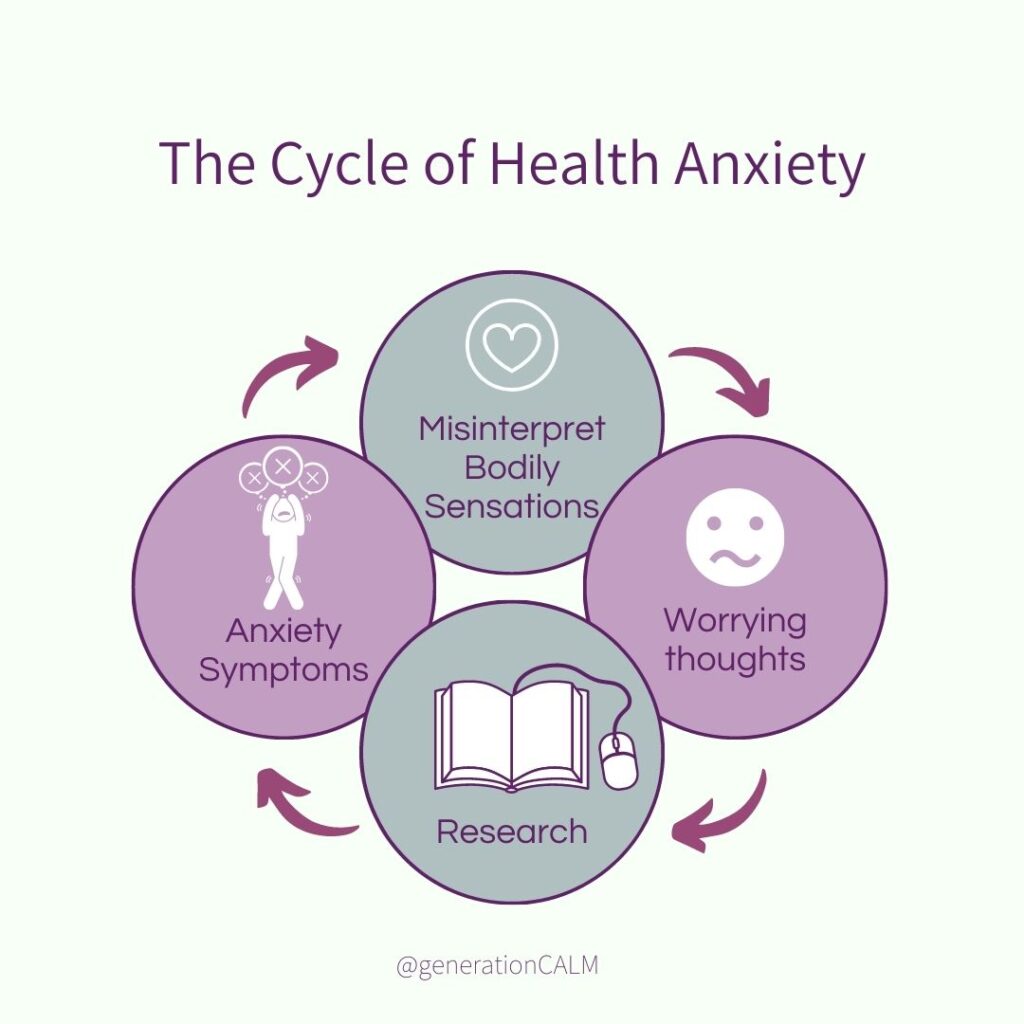How To Stop Worrying About Health: Break The Health Anxiety Cycle
Are you someone who can’t stop worrying about your health? Do you go down the Google rabbit hole, chasing your symptoms, only to find a new serious illness?
Googling your symptoms before a doctor’s visit can be useful because you have more understanding about which symptoms are worth talking about. And it helps you think about how to describe the symptoms more clearly for the health professional to understand. This produces a better relationship with the doctor.
But there is a mental health disorder called health anxiety that describes a person who constantly worries they have a serious illness when, in fact, they don’t.
What is Health Anxiety?
Health anxiety affects 5-10% of the general population. A person with health anxiety will believe they have an illness, and seek reassurance from others (either doctors or family members) but disregard other people’s opinions about the symptoms. At a clinical level, it can stop people enjoying their daily activities because they believe it will lead to more symptoms. And they live in permanent fear of having or developing a serious illness. The anxiety and fear is real even if the symptoms are benign and an enormous amount of time is spent checking, seeking reassurance and researching health conditions.
Until very recently, health anxiety was known as Hypochondriasis. An unflattering word derived from hypochondriac, which is normally a negative way of telling people they are unnecessarily worrying about health. The term health anxiety describes it much better. Feeling anxious about your health.
A stressful life event can be the trigger for health anxiety forming. Anything from moving house to having a baby. But sometimes it can follow a normal diagnosis of a very real illness, such as diabetes or Parkinson’s disease. This may then lead to extra checking of symptoms and being hypervigilant for changes.
But there is a fine line between Googling your symptoms and engaging in behaviors which perpetuate health anxiety. With all the tracking device wearables on the market it has become easier than ever to become obsessive about checking your heart rate, sleep pattern, calorie consumption, number of steps taken. So what can you do if you find yourself starting to worry more about your health?
How To Stop Worrying About Health
First of all, is there a legitimate health concern? If you have had your health checked recently but you are still worrying, then you’re ready for the next step. If not, and you have new symptoms, please check it out with your primary care doctor first. Do not be frightened to seek a medical opinion.
Stop Misinterpreting Normal Bodily Sensations
The biggest distinction of a person with health anxiety is the ability to misinterpret the normal bodily sensations we all get. This misinterpretation is often assumed to be catastrophic. For example, when I get palpitations I notice the flutter, but don’t pay much mind to it because my heart has been checked and my doctor told me it was a symptom of perimenopause. If someone with health anxiety were to get the same feeling in their chest they may misinterpret the sensation as a precursor to a heart attack. This leads to worrying, which increases anxiety symptoms which have the unfortunate knack of mimicking heart attack symptoms.
Part of the treatment is allowing your sensations to come and go without attachment. And during therapy you learn to tolerate your bodily sensations without seeking reassurance.

Delay The Urge To Look Up Symptoms Online
When you focus on the sensations in your body, it can magnify them, making them more distinctive. Like when you buy a new car, and then you notice that make and model everywhere. It’s a bias in your mind which will interpret those symptoms you’ve been having recently as being explained by the disease you’ve just read about.
This cognitive bias also makes you magnetically compelled to anything health-related. Conversations, news articles, internet forums, expert doctors on TV. It’s like catnip. Your attention is focused on illness.
Reading these articles and other people’s stories heightens your awareness of your own body and you check for the symptoms of the latest news crisis. Don’t forget, these magazines and news outlets are not coming from a place of kindness. It’s a business that profits from your attention and they are skilled at knowing how to hook you.
Cyberchondria is when someone excessively searches for symptoms online. Most people do check for symptoms online, but don’t spend hours and hours on it.
Remember, researching illness increases your anxiety. See if you can tolerate delaying the compulsion to check by 15 minute increments.
Stop Seeking Reassurance
It’s going to feel uncomfortable to stop seeking reassurance from family members or your doctor. But seeking reassurance only helps ease your anxiety in the short-term. Even medical tests stop having the calming effect they once did.
While sitting in the doctor’s office you feel reassured, but by the time you’ve returned home and are alone with your thoughts, the doubts creep in. Perhaps the test results were wrong, perhaps they didn’t test for the right thing, maybe it’s a different disease.
If you are tempted to ask your friends and family members their opinion about your symptoms, pause beforehand. It’s OK to feel uncomfortable.
Stop Checking Your Symptoms So Often
If you are constantly checking bumps, moles and lymph glands, it’s time to slow down. It’s not necessary to do this more than once a month. It might also be time to stop wearing tracking devices that measure your heartbeat or sleep. They’re not as accurate as you might think. And it could be easy to get obsessive about keeping your heartrate under a certain level.
Relaxation for Health Anxiety
Relaxation has a two-pronged attack on health anxiety. First, worrying can cause symptoms of anxiety and panic which easily increase your concerns about your health. Practicing relaxation techniques will reduce the sensations of anxiety, and therefore, reduce the extra symptoms that anxiety produces.
Secondly, as you stop checking online or seeking reassurance from others, you will initially feel more anxious. Stopping a compulsion is almost like stopping a alcohol problem cold-turkey. That’s where relaxation techniques can really help you tolerate the lack of knowing.
Relaxation can come in many forms. Experiment with techniques to find a practice that works for you. You might want to use a more active form of relaxation such as gardening or doing a puzzle, if you find distraction works best for you. Check out my article about Progressive Muscle Relaxation.
Notice When Your Intrusive Thoughts About Your Health Get Worse
Intrusive thoughts and ruminating about symptoms increase your preoccupation with your health. But these thoughts can become more frequent or powerful when your guard is down.
Do you have friends who make you more anxious about chemicals you might be ingesting? Do news reports start a frantic worry about a local lockdown? Does an innocent scroll through Instagram turn into concern about another illness?
Pause and notice when and where your anxiety gets worse. Recognise that it’s probably your health anxiety that’s making these thoughts more powerful. But there are certain people or events that can trigger you to feel more anxious.
Your anxiety might also be heightened by reading news stories about medical disorders. News outlets get a lot of clicks on articles that start with ‘My doctor misdiagnosed my …” But they don’t realise how many hours of worrying it will cause for some people.
Reading these articles and other people’s stories heightens your awareness of your own body and you check for the symptoms of the latest news crisis.
Take Up Your Favorite Hobbies Again
You may have let your health concerns stop you from doing certain things for fear of increasing symptoms. Avoidance of these activities will increase your anxiety in the long-term. Did you stop exercising because it made your heart beat too fast? Have you given up knitting because you stopped finding the time for it? Has gardening lost it’s appeal?
Notice the balance of enjoyable versus draining activities in your life and reflect on whether you could increase your level of activity again.
Self-compassion
You may feel guilty that you are taking up the time of doctors and health services who could be helping people with more a more serious illness.
Be gentle on yourself. Health anxiety is very common and is even more so since medical advice is at our fingertips. And, of course, since the pandemic.
Feeling ashamed, embarrassed or guilty has no place in your life.
Where To Seek Help For Health Anxiety
The first port of call is always your own GP. But sometimes, they are not well-versed in mental health and may, through their own biases dismiss the symptoms as being ‘all in your head’. If this is the case, please seek out another doctor or nurse to talk to.
You will most likely be referred to a psychology department for Cognitive Behavioural Therapy.
The treatment of choice for health anxiety is Cognitive Behavioural Therapy (CBT) and Acceptance & Commitment Therapy (ACT). Both of which include looking at thoughts, feelings and behaviours. And during therapy you learn to tolerate your bodily sensations without seeking reassurance. This is done after practicing relaxation techniques that work for you. However, there is some evidence that Mindfulness Based Cognitive Therapy can also facilitate helpful changes in thoughts, emotions and body sensations.
What to do next
I have created a guided meditation which I hope will be part of your relaxation routine and help you on your journey to overcoming health anxiety.
Guided meditation can help you to relax both your mind and body, and reduce your anxiety symptoms.

